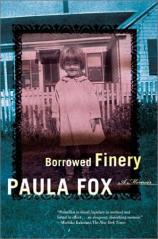Borrowed Finery
Review
Borrowed Finery
In the unhappy-childhood sweepstakes, practically everyone I know
is a contender. My father ran off with a neighbor when I was 14. My
mother drank. This friend was beaten. That one was sexually abused.
It's a wonder we all made it to adulthood. But we did, and with a
sense of ourselves that may be keener because of the pain we grew
up with. Kids who are hurt become, inevitably, observers --- they
must master their feelings, anticipate attacks, live with
abandonment. They must see clearly.
This Paula Fox does, without self-pity and with enormous elegance
and understatement. In BORROWED FINERY, the story of the first
20-odd years of her life, she shows us pathological parents, remote
from the normal pathways of love: She was barely allowed to be a
child at all, in the ordinary sense of being nourished and cared
for. It is her mother and father who are the kids in this book: a
reckless, feckless, quick-witted, handsome, and thoroughly
self-destructive pair. Having abandoned Fox at birth, they
proceeded to waltz in and out of her life --- never really taking
responsibility, but not letting her forget them, either.
Fox's parents did not hit or rape or starve her. They simply
weren't interested and were not often present. And their behavior,
when they were there, was so antiparental (unparental is not strong
enough) that it boggles the mind: Upon hearing Fox observe that her
room-service tray had no milk on it, her father threw the dinner
out of the window. She went to bed hungry. He borrowed (and never
repaid) $50 from her when she was 11 or 12 and took back a
typewriter he'd just given her. Her mother once "fixed" Fox's
toothache by taking her on a terrifying car ride through the
mountains.
One is appalled but fascinated and grateful that Fox wasn't
relegated entirely to the world of orphanages and foster care. "By
chance, by good fortune, I had landed in the hands of rescuers,"
she writes, "a fire brigade that passed me along from person to
person until I was safe." The first and foremost of these was
"Uncle Elwood," a Congregational minister who, out of the goodness
of his heart (they were not related), took care of Fox in her early
years, making room for her "real" parents from time to time. They
lived in a town called, unbelievably and aptly, Balmville. "I would
have been one of those children found in a wilderness, written
about in case histories, if it had not been for Uncle Elwood," Fox
writes; "I had learned civility and kindness from him."
After that sanctuary ended, her life morphed into a crazy-quilt of
hand-me-down clothes and serial schools and temporary arrangements
--- trains not met, bills not paid, affection not given. The cast
of adult characters was always shifting, and no one seems to have
been entirely in charge. Maybe that's why Fox's chapter headings
are place names, not people: Hollywood and New Hampshire, Long
Island and New York City, Florida and Montreal. In a way, she
brought herself up. Forced to assess what each person or relative
would be to her and learn --- yet again --- how to fend for herself
in every new situation, Fox became an expert at uncertainty: "I
knew how to behave in parlous circumstances, to temporize and
compromise, a lesson taught me by my father." Her father, a
screenwriter, also passed on book lore, taught her to swim
(cruelly) and drive (patiently). "I had begun...to notice an
impulse in him --- noble, he would have called it in someone else
--- to teach," Fox writes. But his "servitude to alcohol" got in
the way.
Fox gives her readers enough time-and-place markers to know when
and where we are, but her book isn't a saga heavy with detail and
rich in long, rolling sentences. It is a montage of scenes and
epiphanies, as if portions of her past had suddenly been made
visible by a flash of lightning, and the writing is vivid and
precise and spare. On her first meeting with her father, at the age
of four or five: "The word father was outlandish. It held an
ominous note. I was transfixed by it. It was as though I had
emerged from a dark wood into the sudden glare of headlights." And
at the other end of the book, as she struggles with adulthood, "My
life was incoherent to me. I felt it quivering, spitting out broken
teeth."
It is taking nothing away from Fox's originality to say that
BORROWED FINERY is strikingly Dickensian: her abandonment as a
baby, not to mention the array of eccentrics --- Uncle Elwood could
have walked straight out of David Copperfield, name and all --- who
rescued and rejected her. And there is a twisty, almost Victorian
symmetry in the final chapter (the surprise is too good to give
away), where Fox defies her chaotic upbringing and reasserts a
sense of family. Like Dickens, who also had an abysmal childhood,
she not only has moral intelligence, but she knows how to tell a
hell of a good story.
Reviewed by Kathy Weissman on January 21, 2011
Borrowed Finery
- Publication Date: September 2, 2002
- Genres: Nonfiction
- Paperback: 216 pages
- Publisher: Holt Paperbacks
- ISBN-10: 0805071849
- ISBN-13: 9780805071849



